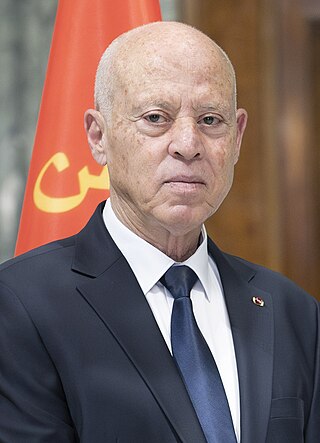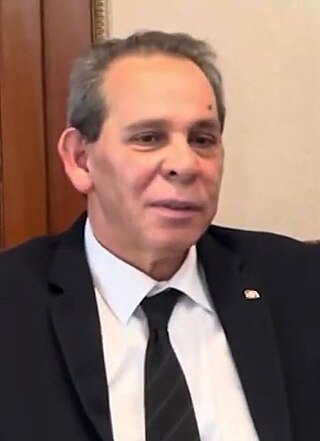| |||||
| Decades: | |||||
|---|---|---|---|---|---|
| See also: | |||||
Events in the year 2024 in Tunisia .
| |||||
| Decades: | |||||
|---|---|---|---|---|---|
| See also: | |||||
Events in the year 2024 in Tunisia .
Source: [24]

The politics of Tunisia takes place within the framework of a unitary semi-presidential representative democratic republic, with a president serving as head of state, prime minister as head of government, a unicameral legislature and a court system influenced by French civil law. Between 1956 and 2011, Tunisia operated as a de facto one-party state, with politics dominated by the secular Constitutional Democratic Rally (RCD) under former presidents Habib Bourguiba and then Zine el Abidine Ben Ali. However, in 2011 a national uprising led to the ousting of Ben Ali and the dismantling of the RCD, paving the way for a multi-party democracy. October 2014 saw the first democratic parliamentary elections since the 2011 revolution, resulting in a win by the secularist Nidaa Tounes party with 85 seats in the 217-member assembly.

2024 (MMXXIV) is the current year, and is a leap year starting on Monday of the Gregorian calendar, the 2024th year of the Common Era (CE) and Anno Domini (AD) designations, the 24th year of the 3rd millennium and the 21st century, and the 5th year of the 2020s decade.

Abdelwahab Abdallah is a Tunisian politician and diplomat who served as the Minister of Foreign Affairs of Tunisia and was advisor to the President.

The Tunisian revolution, also called the Jasmine Revolution and Tunisian Revolution of Dignity, was an intensive 28-day campaign of civil resistance. It included a series of street demonstrations which took place in Tunisia, and led to the ousting of longtime dictator Zine El Abidine Ben Ali in January 2011. It eventually led to a thorough democratization of the country and to free and democratic elections, which had led to people believing it was the only successful movement in the Arab Spring.

Presidential elections were held in Tunisia on 23 November 2014, a month after parliamentary elections. They were the first free and fair presidential elections since the country gained independence in 1956, and the first direct presidential elections after the Tunisian Revolution of 2011 and the adoption of a new Constitution in January 2014.

Mohamed Moncef Marzouki is a Tunisian politician who served as the fifth president of Tunisia from 2011 to 2014. Through his career he has been a human rights activist, physician and politician. On 12 December 2011, he was elected President of Tunisia by the Constituent Assembly.

Hesham Mohamed Qandil is an Egyptian engineer and civil servant who was Prime Minister of Egypt from 2012 to 2013. Qandil was appointed as prime minister by President Mohamed Morsi on 24 July 2012 and sworn in on 2 August 2012. Qandil previously served as Minister of Water Resources and Irrigation from 2011 to 2012.

Kais Saied is a Tunisian politician, jurist and retired assistant professor of law currently serving as the seventh president of Tunisia since October 2019. He was president of the Tunisian Association of Constitutional Law from 1995 to 2019.
Events in the year 2020 in Ivory Coast.
Events in the year 2021 in Tunisia.

The 2021 Tunisian self-coup took place on 25 July 2021, when Tunisian President Kais Saied dismissed the government of Hichem Mechichi, suspended the Assembly of the Representatives of the People and revoked the immunity of its members. Described as a self-coup, the move came after a period of political instability marked by a series of protests against the Ennahda-backed government and the collapse of the Tunisian healthcare system amidst the COVID-19 pandemic in the country.

Najla Bouden, also known as Najla Bouden Romdhane, is a Tunisian geologist and university professor who served as the prime minister of Tunisia from October 2021 to August 2023. She took office on 11 October 2021, making her the first female prime minister both in Tunisia and the Arab world. She previously served in the education ministry in 2011.
The history of Africa in the 2020s covers political events on the continent, other than elections, from 2020 onwards.
Events in the year 2023 in Tunisia.
Presidential elections were held in Tunisia on 6 October 2024. They were the first presidential elections since the promulgation of the 2022 constitution and were boycotted by most parties. After rejecting several candidacies, including those of the main opponents of incumbent president Kais Saied, the Independent High Authority for Elections (ISIE) confirmed the candidacies of only three candidates; Saied and former deputies Zouhair Maghzaoui and Ayachi Zammel, rejecting those of Mondher Zenaidi, Abdellatif Mekki and Imed Daïmi, who had been reinstated by the Administrative Court. This decision was contrary to the constitution, which stipulates that the decisions of the Administrative Court cannot be appealed.

Ahmed Hachani is a Tunisian politician. He served as Prime Minister of Tunisia from 1 August 2023 to 7 August 2024.
Kamel Feki is a Tunisian politician who served as the Minister of the Interior from 2023 to 2024.
Kamel Madouri is a Tunisian politician. He has served as prime minister of Tunisia since 7 August 2024.
Events in the year 2025 in Tunisia.
The MadouriCabinet it's the current government of Tunisia. On 25 August 2024, the government was reshuffled with the arrival of 19 new ministers and three secretaries of state.